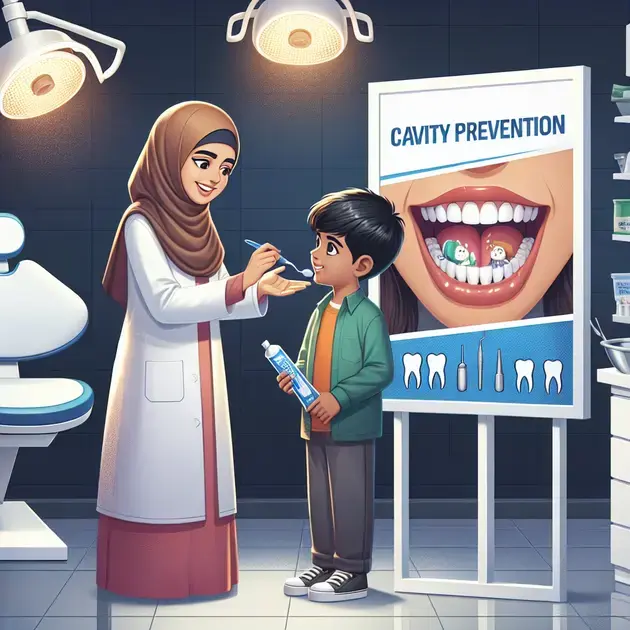Do you know the importance of exploring oral cavities? In this comprehensive guide, we will cover everything you need to know about oral health and hygiene.
From the latest advancements in cavity prevention to tips for maintaining a healthy smile, our aim is to provide you with valuable insights and practical advice for optimal oral care.

Understanding Oral Health Basics
Understanding oral health basics is essential for maintaining a healthy smile. Oral health encompasses the condition of your teeth, gums, and overall mouth. By taking good care of your oral health, you can prevent various dental issues and maintain a bright smile.
Here is a step-by-step guide to understanding oral health basics:
1. Brushing and Flossing
One of the fundamental aspects of oral health is brushing and flossing your teeth regularly. Brush your teeth at least twice a day with a fluoride toothpaste to remove plaque and food particles. Flossing is equally important to clean between your teeth and along the gumline where a toothbrush can’t reach.
You can find more information on proper brushing and flossing techniques on the American Dental Association website.
2. Regular Dental Check-ups
Schedule routine dental check-ups with your dentist to monitor your oral health. Dentists can detect early signs of cavities, gum disease, and other oral issues before they become serious problems. By visiting your dentist regularly, you can maintain good oral health and address any concerns promptly.
Use the Zocdoc app to find a reputable dentist near you and book an appointment conveniently.
3. Healthy Diet
Your diet plays a significant role in your oral health. Consuming sugary and acidic foods and drinks can contribute to cavities and tooth decay. Opt for a balanced diet rich in fruits, vegetables, lean proteins, and dairy products to support your oral health. Drinking plenty of water also helps wash away food particles and bacteria.
Visit the Eatright.org website for tips on maintaining a healthy diet for your oral health.
4. Avoid Tobacco
Smoking and using tobacco products not only harm your overall health but also have detrimental effects on your oral health. Tobacco use increases the risk of gum disease, oral cancer, and other oral conditions. By quitting tobacco or never starting, you can improve your oral health and overall well-being.
Explore the Smokefree.gov website for resources and support to quit smoking and tobacco use.
5. Use Mouthwash
Adding mouthwash to your oral hygiene routine can help reduce plaque, prevent cavities, and freshen your breath. Choose a mouthwash that contains fluoride and antimicrobial ingredients for optimal oral health benefits. Incorporate mouthwash into your daily routine after brushing and flossing for comprehensive care.
Check out the Crest website for information on different types of mouthwash products and their benefits.
The Role of Oral Hygiene in Preventing Cavities
Oral hygiene plays a crucial role in preventing cavities and maintaining a healthy smile. Cavities, also known as dental caries, are caused by bacteria that produce acids and damage the tooth enamel. By prioritizing oral hygiene practices, you can reduce the risk of cavities and other dental issues.
Here is a step-by-step guide to understanding the role of oral hygiene in preventing cavities:
1. Proper Brushing Technique
Brushing your teeth properly is essential for removing plaque and bacteria that can lead to cavities. Use a soft-bristled toothbrush and fluoride toothpaste to brush your teeth in gentle, circular motions. Pay special attention to all tooth surfaces and along the gumline to ensure thorough cleaning.
Watch tutorials on proper brushing techniques on the Colgate website for guidance.
2. Dental Sealants
Dental sealants are thin, protective coatings applied to the chewing surfaces of the back teeth to seal off crevices where bacteria can hide. Sealants help prevent plaque buildup and decay in these vulnerable areas. Children and adults can benefit from dental sealants as part of their cavity prevention strategy.
Learn more about dental sealants and their application process on the MouthHealthy.org website.
3. Limit Sugary Foods and Drinks
Sugary foods and beverages can fuel the production of acids that attack tooth enamel and lead to cavities. Limit your intake of sugary snacks, sodas, and sweets to reduce the risk of cavities. Opt for healthier snacks like fruits, nuts, and vegetables to support your oral health.
Visit the NHS website for tips on reducing sugar in your diet for better oral health.
4. Fluoride Treatment
Fluoride is a mineral that strengthens tooth enamel and helps prevent cavities. Incorporating fluoride into your oral care routine through fluoridated toothpaste, mouthwash, and professional treatments can protect your teeth from decay. Consult your dentist to determine the best fluoride options for your oral health needs.
Explore the ADA’s resources on fluoride and its benefits for cavity prevention.
5. Regular Dental Cleanings
Professional dental cleanings are essential for removing plaque and tartar buildup that brushing and flossing alone may not address. Dental hygienists use specialized tools to clean your teeth thoroughly and check for any signs of cavities or gum disease. Schedule regular cleanings every six months to maintain optimal oral hygiene.
Use the Opencare platform to find and book dental cleaning appointments with trusted providers in your area.

The Importance of Regular Dental Check-ups
Regular dental check-ups are essential for maintaining good oral health and preventing potential problems in the future. By visiting your dentist on a consistent basis, you can address any issues early on and avoid more serious complications down the line. During these check-ups, your dentist will thoroughly examine your teeth and gums, looking for signs of decay, gum disease, or other oral health issues.
Furthermore, regular dental check-ups often include professional cleanings, which help remove plaque and tartar buildup that cannot be eliminated through regular brushing and flossing alone. These cleanings not only improve the appearance of your teeth but also contribute to overall oral health.
Another important aspect of regular dental check-ups is the opportunity to discuss any concerns or questions you may have with your dentist. Whether you are experiencing tooth sensitivity, bleeding gums, or any other oral health issue, your dentist can provide guidance and treatment options to address these issues effectively.
By prioritizing regular dental check-ups, you are investing in your long-term oral health and well-being. Prevention is key when it comes to dental care, and these check-ups play a significant role in keeping your smile healthy and beautiful for years to come.
Common Causes of Tooth Decay
Tooth decay is a common oral health problem that can lead to cavities, pain, and other complications if left untreated. Understanding the common causes of tooth decay is essential for taking proactive steps to prevent this issue. One of the primary factors that contribute to tooth decay is poor oral hygiene habits, such as infrequent brushing and flossing.
Consuming sugary and acidic foods and beverages also increases the risk of tooth decay. Bacteria in the mouth feed on sugar, producing acids that erode tooth enamel and create an environment conducive to decay. Additionally, dry mouth, which can result from factors like medication use or certain health conditions, can inhibit saliva production and increase susceptibility to decay.
Another common cause of tooth decay is the presence of plaque, a sticky film of bacteria that forms on teeth. When plaque is not effectively removed through proper oral hygiene practices, it can harden into tartar, leading to decay and other oral health issues. Furthermore, factors like genetics, age, and poor dietary choices can also contribute to the development of tooth decay.
By addressing these common causes of tooth decay through regular brushing and flossing, a balanced diet, and routine dental check-ups, you can significantly reduce your risk of experiencing this prevalent oral health problem.
Foods to Avoid for Better Oral Health
The foods we consume play a significant role in our oral health, and avoiding certain items can help maintain a healthy smile. Sugary foods and beverages are notorious for promoting tooth decay, as sugar feeds oral bacteria that produce acids harmful to tooth enamel. By limiting your intake of candies, sodas, and desserts, you can reduce the risk of cavities and other dental issues.
Acidic foods and drinks, such as citrus fruits and carbonated beverages, can also erode tooth enamel and contribute to oral health problems. These items weaken the protective layer of teeth, making them more vulnerable to decay and sensitivity. It is advisable to consume acidic foods in moderation and rinse your mouth with water after consumption to help neutralize acids.
Sticky and chewy foods, like caramel and dried fruit, can adhere to teeth and linger in the mouth, promoting bacterial growth and plaque formation. Regularly consuming these items without proper oral hygiene practices can increase the risk of cavities and gum disease. Additionally, hard foods like ice and popcorn kernels can potentially damage teeth and dental restorations if bitten down on forcefully.
By being mindful of the foods you consume and making informed choices to avoid items that can harm your oral health, you can contribute to a healthier smile and overall well-being. Incorporating a balanced diet rich in nutrients and staying hydrated with water are beneficial habits for maintaining optimal oral health.
Conclusion
In conclusion, regular dental check-ups are crucial for maintaining optimal oral health and preventing potential issues from escalating. These appointments allow for early detection and intervention, reducing the risk of more severe complications. Through thorough examinations and professional cleanings, dentists can address decay, gum disease, and other oral health concerns effectively, contributing to overall well-being.
Understanding the common causes of tooth decay is essential for taking proactive measures to prevent this prevalent issue. Poor oral hygiene, sugary and acidic foods, dry mouth, and plaque buildup are primary contributors to decay. By incorporating regular brushing and flossing, a balanced diet, and attending routine dental check-ups, individuals can significantly reduce their susceptibility to cavities and related complications.
Furthermore, making informed dietary choices by avoiding sugary, acidic, sticky, and hard foods can enhance oral health and help maintain a healthy smile. Limiting consumption of detrimental items, rinsing the mouth after acidic foods, and practicing proper oral hygiene are key in preventing decay and promoting optimal oral health. By prioritizing these practices, individuals can contribute to long-term oral health and well-being.